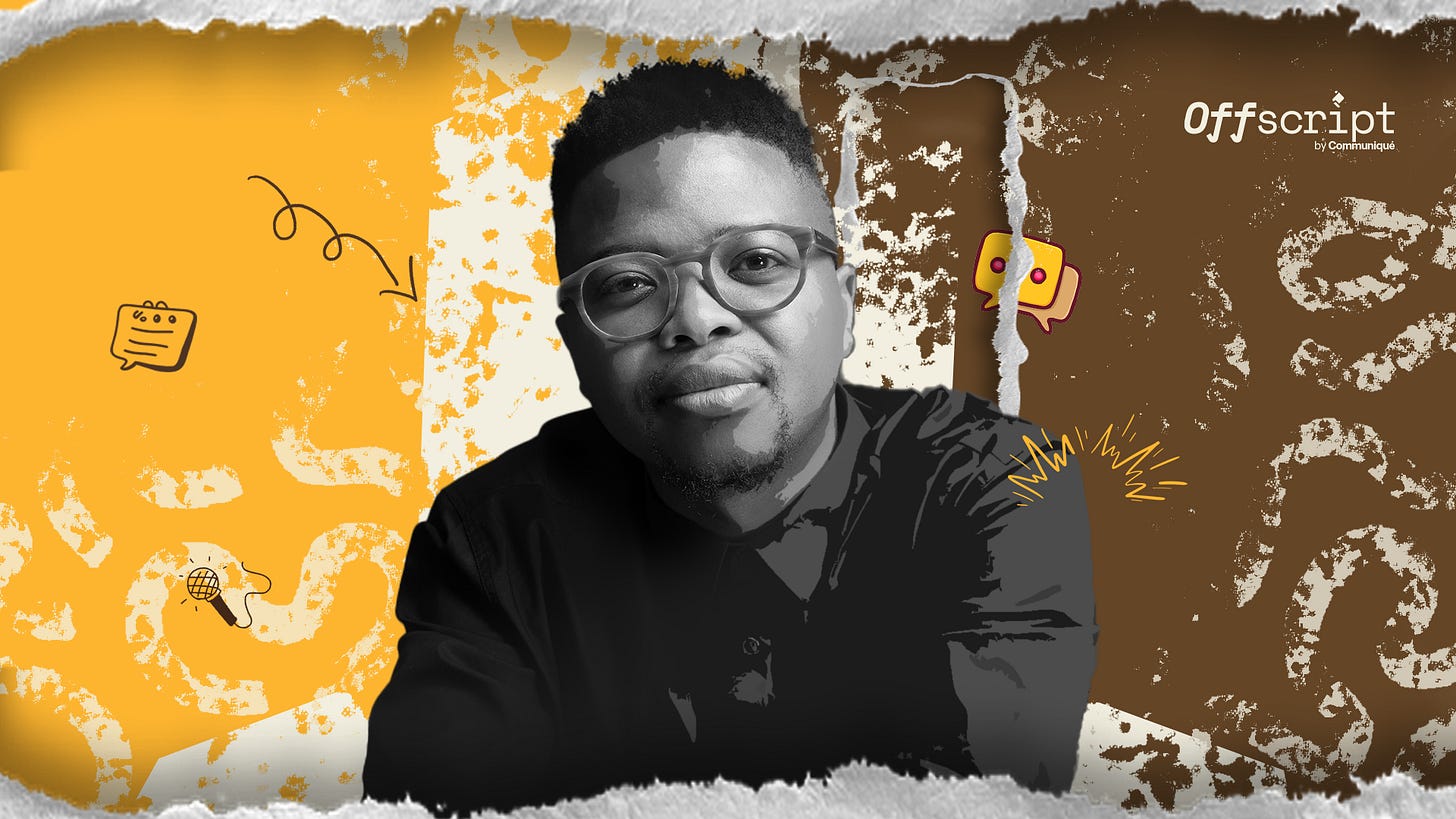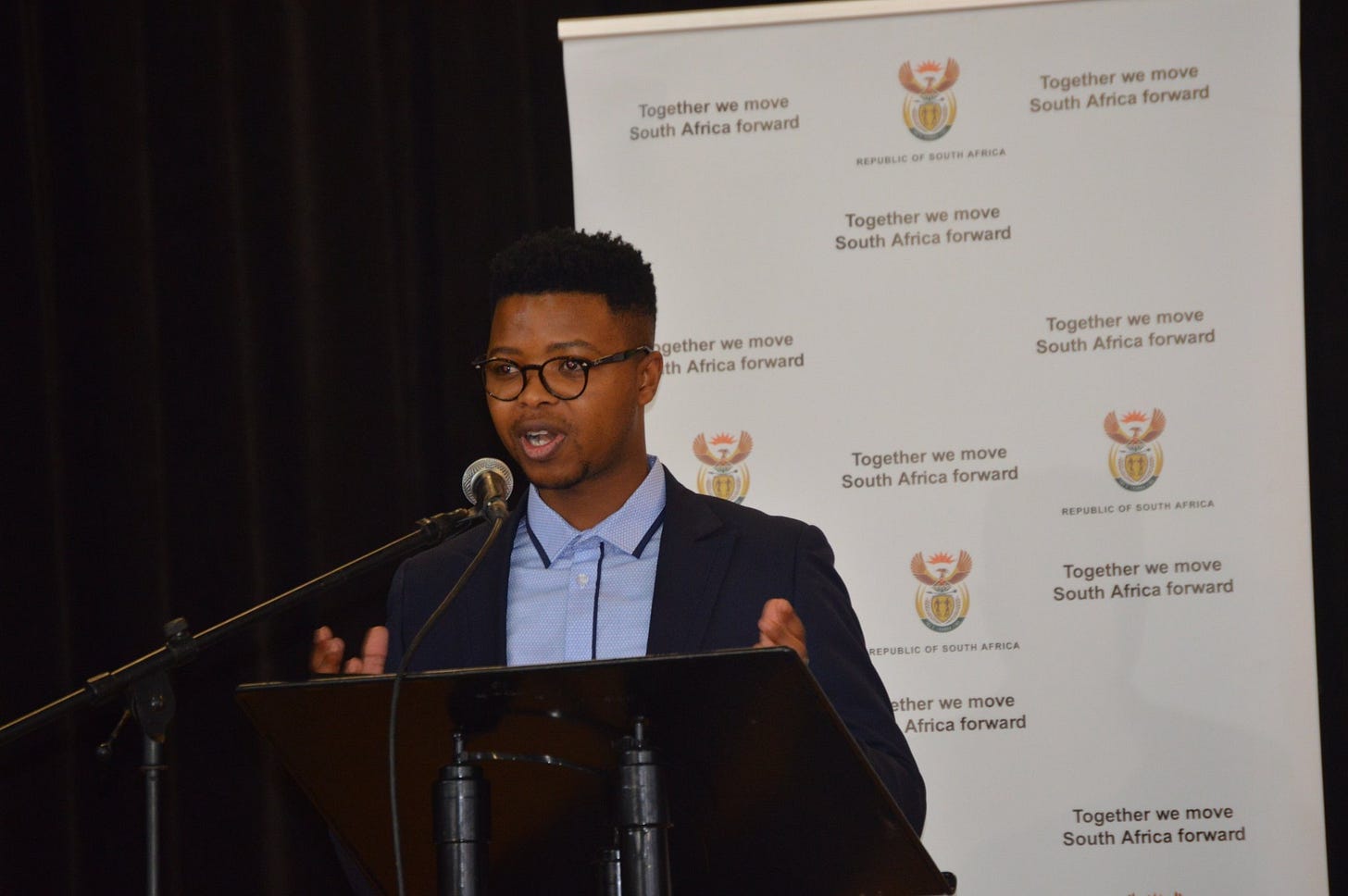Offscript with Lonwabo Mavuso
Andani.Africa’s executive director on his journey to building Southern Africa’s leading creative economy research firm.
“I grew up with this idea that I could explore and be what I wanted to be.”
Lonwabo Mavuso doesn’t look away from problems when he finds them. That instinct, to study, understand, and then solve problems, was responsible for the creation of Andani.Africa, a pan-African research firm dedicated to the cultural and creative industries. In the nine years since its founding, Andani.Africa has worked across much of Southern Africa, often in partnership with Kenya’s HEVA Fund and Nigeria's CcHub. Among its landmark projects is the feasibility study that led to the establishment of the Resistance and Liberation Movement Museum in South Africa.
Everything, his problem-solving skills and devotion to the cultural and creative industries, started with the environment he grew up in. Born to parents deeply committed to the arts, Mavuso was raised to see culture and creativity not as extracurricular but as essential. His father, who was once imprisoned with Nelson Mandela on Robben Island, made sure his children grew up with the freedom he did not have. Music, museums, festivals, and theatre were part of everyday life.
By the time he reached university, Mavuso had played in school bands, acted in drama troupes, and immersed himself in the performance arts. He was a bit uncertain of what to study in school because throughout his life, he had been involved in the arts and wanted to see if there were any alternatives. But with the encouragement of his parents, he decided to formalise his love for the arts. He chose Dramatic Arts (Film Production) at the University of Witwatersrand (Wits, as the alumni fondly call it), Johannesburg.
At Wits, Mavuso quickly identified a problem. “In my second year, we were already producing short films. I became frustrated that we were investing so much time and effort in these films, only to screen them for our immediate class of about 20 students. I believed our work deserved a wider audience across the entire student community in the country.”
It turned out Mavuso wasn’t the only one thinking along those lines. When he and his peers pitched the idea to the school authorities, they gave their full support. The theatre manager, who had quietly harboured the same vision, championed it enthusiastically. What began as a plan for Wits quickly expanded to include the entire student filmmaking community across South Africa. To make that leap, they sought bigger sponsors and official backing, presenting their proposal to the Gauteng provincial government and the Gauteng Film Commission. Both approved the idea and committed funding to bring it to life.
South Africa’s national broadcaster, the South African Broadcasting Corporation (SABC), also came on board as a sponsor. “They were super excited about this film festival because, within their programming, they did not have anything that catered to the development of young filmmakers. And in their mandate as a broadcaster, they were supposed to develop emerging filmmakers.”
The festival was named the Bafundi Film Festival, with “Bafundi” derived from the Xhosa word for student. It served as a platform where student filmmakers and industry professionals could exchange ideas and experiences. Alongside film screenings, the festival featured workshops led by established producers who shared insights into the realities of working in the film industry.
The Bafundi Film Festival only ran for three years. Mavuso and his peers eventually found it difficult to balance running the event with completing their degrees, and their main sponsor, SABC, faced financial constraints that reduced its support. Still, the experience left a lasting mark on him. “This was the beginning of my understanding of cultural production and of how to put things together within the creative industries,” he reflects.
Before completing his degree, Mavuso was recruited by his department head to manage another university arts festival. Starting in his final year, he became deputy festival director for the Drama for Life programme, a role he held for three years after graduation before rising to fundraising manager for another initiative at Wits. These roles broadened his perspective and deepened his understanding of the cultural sector. “It was from an academic and developmental perspective,” he says, “but it gave me a sense of who’s out there and the different mandates of organisations within the broader cultural space.”
From there, he joined Business and Arts South Africa (BASA), a public–private partnership between the Department of Arts and Culture and the private sector. At BASA, he encountered the very problem that would later inspire Andani.Africa. The organisation’s core mandate was to attract private-sector investment into the creative industries, often by commissioning research to demonstrate the sector’s value. But the studies, while useful, were typically broad and lacked the depth and nuance needed to fully capture the realities of the cultural and creative industries.
“At the time, there wasn’t a specialist research firm that focused on the culture and creative industries. We would hire general research companies to conduct research for us. What they produced often lacked the nuances of the culture and creative industries. It was very broad and missed many of the intricacies of the cultural and creative industries.”
Source: Lonwabo Mavuso
Andani.Africa began as a side project in 2016 while Mavuso was still at BASA. After leaving BASA, he spent two years at South African Tourism, the country’s international tourism agency, before resigning to focus on building Andani. Africa full-time.
Nearly a decade later, Andani.Africa has carved out a clear niche and continues to evolve in its approach. Beyond supporting cultural projects, the firm is also innovating with technology. Its latest launch, Malaika, is a digital data management platform that helps creative industry organisations track their progress more efficiently, shifting them from paper-based spreadsheets to an automated, centralised system.
“We have bigger ambitions for Malaika. Our goal is to help creative industry organisations learn from their own data. For example, National Arts Councils hold vast amounts of information, but they can’t fully utilise it because of how it’s stored and managed. Malaika is designed to change that.”
For Mavuso, the cultural and creative industries remain his first love, but they have also become a springboard into broader ambitions. Alongside his work at Andani.Africa, he is now exploring special economic zones as tools for unlocking Africa’s prosperity. “I’m very interested in making trade easier across the continent,” he says, “particularly in finding practical ways to implement the African Continental Free Trade Agreement so it enables real, tangible trade.”
This new mission is rooted in the confidence and competence he gained from years in the creative industries. For Mavuso, the lessons learned there are transferable: if you can solve the sector’s challenges, you can apply the same thinking to other industries.
“I believe I have a unique perspective on the difficulties of trade and commerce in Africa through the lens of the creative industries,” he says. “That perspective has given me the ambition to take on other challenges the continent faces beyond culture. But the cultural and creative industries will always be my first love, for lack of a better word.”




